Messages from the President
2025
Fourteenth Global Summit of Research Institute Leaders (October 4, 2025)
On October 4, President Gonokami along with Antoine Petit of the French National Centre for Scientific Research (CNRS), co-chaired the Fourteenth Global Summit of Research Institute Leaders (RIL). The summit which is co-hosted by RIKEN and the National Institute of Advanced Industrial Science and Technology (AIST) is held yearly in Kyoto, coinciding with the STS forum. The theme of this year’s RIL was “Working together to enhance trust in science.” See the news article for more details.

Ceremony to commemorate launch development of “FugakuNEXT” (August 22, 2025)
The ceremony was held by RIKEN to commemorate the launch of the development of a new flagship system (development code name: “FugakuNEXT”), which will be the next generation of the supercomputer Fugaku, as an international initiative between RIKEN, Fujitsu and NVIDIA.
 Front row, from left: Fujitsu Vice President Mahajan, MEXT Director of the
Front row, from left: Fujitsu Vice President Mahajan, MEXT Director of the
Research Promotion Bureau Fuchigami, President Gonokami, NVIDIA Vice President Buck
Related link: Launch of the international initiative for "FugakuNEXT" development Ceremony (August 22, 2025)
Discussion on cooperation between RIKEN and Luxembourg (July 14, 2025)
President Gonokami discussed cooperation between RIKEN and research institutes in Luxembourg with H.E. Stéphanie Obertin, Minister for Digitalization, Research and Higher Education.
 (From left) President Gonokami, Minister Obertin
(From left) President Gonokami, Minister Obertin
RIKEN, the University of Tokyo, and the Potsdam Institute for Climate Impact Research Sign Memorandum of Understanding on Collaboration and Cooperation (July 18, 2025)
RIKEN, the University of Tokyo, and the Potsdam Institute for Climate Impact Research in Germany have signed a Memorandum of Understanding on the establishment of scientific research infrastructure to contribute to the maintenance of global commons, effective as of July 1, 2025. A commemorative ceremony was held in Tokyo and online in a hybrid format on July 18.
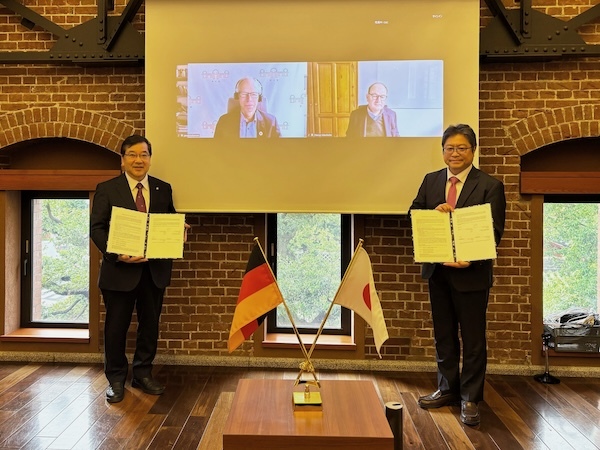 RIKEN President Makoto Gonokami (left) , Potsdam Institute for Climate Impact Research, Director Johan Rockström (left of the screen), Director Ottmar Edenhofer (right of the screen) and the University of Tokyo, Institute for Future Initiatives, Director Kensuke Fukushi (right)
RIKEN President Makoto Gonokami (left) , Potsdam Institute for Climate Impact Research, Director Johan Rockström (left of the screen), Director Ottmar Edenhofer (right of the screen) and the University of Tokyo, Institute for Future Initiatives, Director Kensuke Fukushi (right)
Visit by NVIDIA Founder and CEO Jensen Huang (April 21, 2025)
President Gonokami exchanged views with NVIDIA Founder and CEO Jensen Huang regarding computational science research and the potential collaborations between RIKEN and NVIDIA.
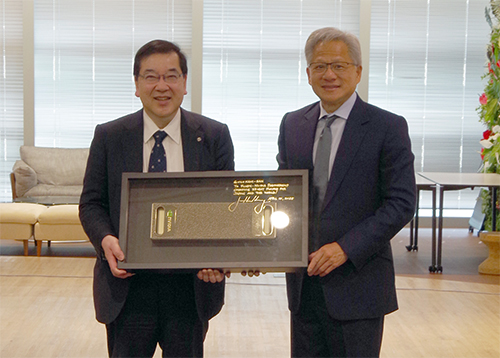 From left: President Gonokami, Founder and CEO Jensen Huang
From left: President Gonokami, Founder and CEO Jensen Huang
Visit by AMD CEO Lisa Su (April 18, 2025)
President Gonokami exchanged views with AMD Chair and CEO Lisa Su regarding computational science research and the potential collaborations between RIKEN and AMD.
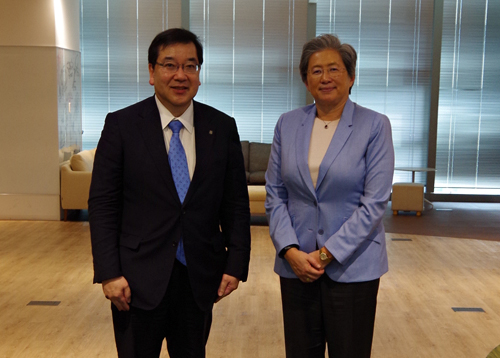 From left: President Gonokami, CEO Lisa Su
From left: President Gonokami, CEO Lisa Su
RIKEN's fifth Mid- to Long-Term Plan has started (April 1, 2025)
I would like to offer my best wishes at the start of the 2025 fiscal year.
It marks the 108th year since RIKEN’s founding in 1917, and is also the beginning of our fifth 7-year Mid- to Long-term Plan as a Designated National Research and Development Agency.
For over a century, humanity has made remarkable strides in science and technology, driving societal growth. However, humanity now faces serious global challenges that threaten our very future – global warming, environmental destruction, economic disparities, and impasses in the system of international collaboration that forms the basis for coordination between countries.
We have also seen a rapid evolution of digital technologies, as seen in growth of the internet and computational science, since the start of the 21st century, and this is being driven further through innovations in generative AI and quantum computers, leading to major social changes. We stand at a crossroads where these cutting-edge technologies have the potential to both trigger the downfall of our society or to bring about a paradigm shift toward more positive growth. With the creation of new science and technology as our mission, RIKEN will not passively leave this choice to others; we will take action, aiming to lead the path to building a better future.
The seven years starting from FY 2025 promise to be an extremely important period that will set the future of human society. The source of the value that RIKEN creates is the free thought that takes flight from the curious minds of individual researchers. Above all, creating an environment where this creativity can be effectively developed is crucial. At the same time, we must all come together to share visions on the future development of our society. I believe that carefully balancing these processes will bring forth the joy of discovery as well as tangible results and a sense of accomplishment that come with fulfilling our responsibility to society.
In the coming period, we will strive even more diligently to be a National Research and Development Agency that uncompromisingly pursues both discovery and social responsibility at a world-class standard. We will also work to expand this pursuit to academia, industry, and government throughout Japan and internationally. I look forward to your continued support and collaboration.
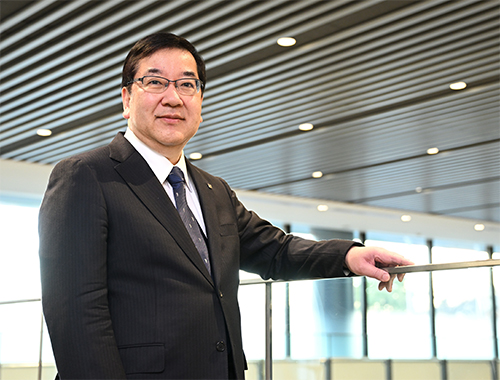
A new structure to support excellence in research
Based on a precise assessment of the latest trends in frontline research, we have introduced a structure based on “research domains” to streamline RIKEN’s management, fully engaging its synergistic capabilities across fields. Five domains have been established: physical science, life science, mathematical/computational/information science, environmental science, and pioneering science, which aims to create new knowledge in an interdisciplinary manner, and the heads of the domains will serve under the president as members of the Board of Executive Directors, RIKEN’s highest policymaking body. This structure has been adopted to encourage cross-disciplinary collaboration based on highly specialized expertise and to accelerate the creation of new knowledge.
In addition, to further encourage collaboration across domains, the TRIP (Transformative Research Innovation Platform of RIKEN platforms) initiative will be expanded, further bolstering its data-driven approach. The concept of TRIP has already permeated throughout RIKEN, as the accomplishments of data analysis and computational science utilizing AI and quantum computers are put to use in myriad research domains. This is promoting interdisciplinary research, hastening the creation of innovative results.
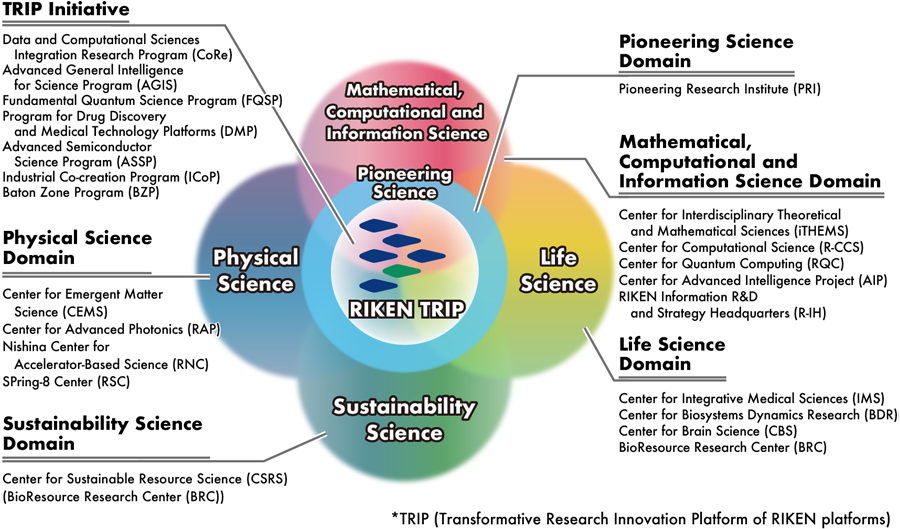
Building a sustainable research environment
We are currently working on full-fledged development and installation projects for the next-generation computing platform Fugaku NEXT and fourth-generation synchrotron radiation facility SPring-8-II, creating an environment where researchers in Japan and around the world can use upgraded, cutting-edge research platforms. We are also working to build a sustainable research environment that aims to reduce CO2 emissions, reducing the environmental impact of RIKEN’s overall research activities.
Fostering next generation talent and strengthening collaboration with universities
In order to foster the abilities of next-generation researchers, we will enhance the RIKEN ECL (Early Career Leaders) Program, actively hire and promote women and international researchers, and promote the exchange of research personnel. We will also establish a support system that will enable researchers who transfer from RIKEN to other research institutions and universities to continue their research at a high standard, contributing to the improvement and reinforcement of Japan’s research environment infrastructure amidst the difficulties identified in recent years. By promoting cross-appointments with universities, we will empower researchers to participate in frontline research no matter where they are in Japan, providing even more chances for them to contribute to future society.
Achieving our vision for the future
It is crystal clear that the 2030s, which will begin during this Mid- to Long-Term Plan period, will be an extremely critical era for all of humanity. We must assess what preparations need to be made now to get our society on track for healthy growth in this new decade, and get to work on these preparations.
In order to realize ideals such as the development of energy sources in harmony with our earth’s environment, zero-waste energy use, treating others with consideration even as cyberspace will become integrated with physical space, and economic systems that encourage these principles, new science will be necessary, and we are the ones who must create it. It is essential that science become a driving force for empathy. For that to happen, research activities must obtain a deep level of trust from society at large, not to mention from within the research community. It is only with this trust that the universal nature of science will lead to the development of empathy.
Aiming to further heighten society’s belief in science, we will contribute to enriching the future and the lives of the people who will live in it. It is my sincere hope that you will understand RIKEN’s initiatives even more deeply, and I am looking forward to your kind support and guidance.
Makoto Gonokami
President, RIKEN
Archives
For more information, please see:
- Makoto Gonokami's Curriculum Vitae
